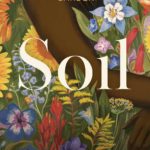A Literary Reflection by Wendy BooydeGraaff
on Kiss the Ground, a Netflix Documentary
and Soil: The Story of A Black Mother’s Garden by Camille T. Dungy
I began watching Kiss the Ground with my spouse, with whom I’ve gardened the twenty-
plus years we’ve had a yard. Throughout those years, we’ve discussed cover crop and lawn
fertilizer, no-mow May and native plants, all with varying levels of successful implementation in
our backyard on the outskirts of Grand Rapids, Michigan, success being measured on a gradient
scale of growing only weeds to producing lush, edible tomatoes and sundry vegetables. So it was
with personal interest we sat down to watch the documentary which focuses on soil, its history in
the United States, and how farming moved from small, multi-crop subsistence practices to large-
scale, war-inspired machinery and techniques. The collateral damage is the soil, which blew
away in the Dust Bowl. Dust is eroded, used-up dirt that can no longer hold the microbes and
rich nourishing matter that enable growth. Although President Roosevelt instituted a soil
conservation act, large scale tilling, carcinogenic fertilizer and pesticide use, and mono-crop
mega-farms have depleted the soil, creating a dependence on and increased usage of fertilizers
and pesticides. Large scale agriculture has to fix their practices in order to repair the soil: capture
more carbon via cover crop, stop tilling, eliminate pesticides, and grow a biodiversity of crops.
Eventually these practices will build up the soil and increase yields.
That night, I began reading Camille T. Dungy’s Soil: A Black Mother’s Garden, a
memoir about her family’s home and garden in Fort Collins, Colorado. Dungy makes the native
plants, the regeneration of soil, the work of a garden, into a frank intimate account of individual
responsibility. She’s a poet, evident in her descriptions of dandelions, for instance: “They find
bare spots in the hard ground where grass roots can’t penetrate and, opportunists that they are,
and hard workers, they dig in, sending taproots as deep as three feet. Breaking up nonproductive
dirt, they start to create healthy, receptive soil.” Interspersed with poems and photos from her
garden, Dungy deftly weaves in her reasons for writing in this historically white male space:
being Black, female, and a mother, her perspective on nature and gardening has been long absent
from canonical nature writing. She discusses Mary Oliver and Annie Dillard, both white, both
child-free. She casts unique perspective on her beloved Marie Cassatt. She discusses gently her
experience bringing Maya Angelou’s work to her graduate class as a student and the disdainful
reception from her white male professors. Gentle, because that is Dungy’s tone, for this and other
exclusionary incidents she reports upon, yet these frictions simmer and pulse, meander
throughout the book. She relays history, religion, her ancestors, race—all of this with her
conversational, philosophical, poet’s reflective voice. She discusses bindweed, an invasive,
insidious plant in her garden that is impossible to remove. These sections are juxtaposed with
stories of racism, ignorance, willful misunderstandings toward her as a Black woman in a
community of white people. The metaphor becomes explicit: Racism is bindweed. It is never
gone, it festers below ground, even when the leaves and stems and roots are removed. The soil
holds this history, all history, and therefore, Dungy’s book about her garden holds stories of this
history as well. Near the end she says, “I dig up a lot of awful history when I kneel in my garden.
But, my god, a lot of beauty grows out of the soil as well.”
Kiss the Ground’s perspective on soil also holds history: the willful damage to the earth
and the food we eat, the poisonous runoff into our water and infiltrated into the food we are sold,
yet narrator Woody Harrelson’s tone is congenial, hopeful. The end of the documentary borders
on the trite and saccharine, but the message is clear that humans can impact the soil and we can
regenerate land by changing farming practices. As individuals, we can compost and buy our food
from local farms that use regenerative practices.
Both documentary and memoir place importance on soil, that crumbly, damp, worm-
crawling earthy matter, to regenerate and renew our failing world. But it’s Dungy’s book that
makes the most personal impact. If we love our gardens, our plants, our natural world, how much
harder we will work to make this environment last.
 Soil: The Story of A Black Mother’s Garden, by Camille T. Dungy
Soil: The Story of A Black Mother’s Garden, by Camille T. Dungy
Simon and Schuster, 2023, 309 pages.
Kiss the Ground, Netflix Documentary directed and produced by Joshua Tickell and Rebecca Tickell, narrated by Woody Harrelson (2020)
Wendy BooydeGraaff’s short fiction, poems, and essays have been included in Stanchion, Slag Glass City, Phoebe, Ninth Letter online, and elsewhere. Born and raised in Ontario, Canada, she now lives in Michigan, United States.
